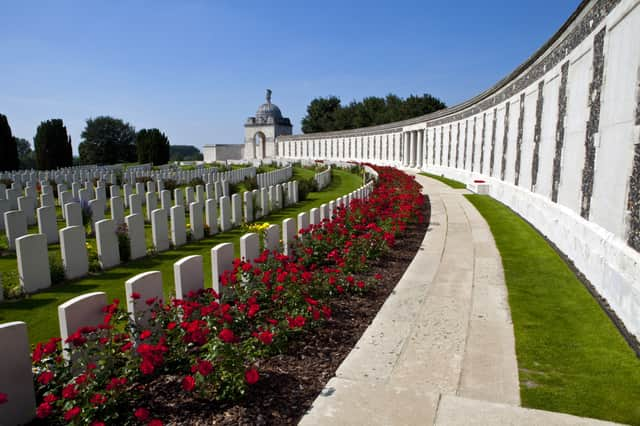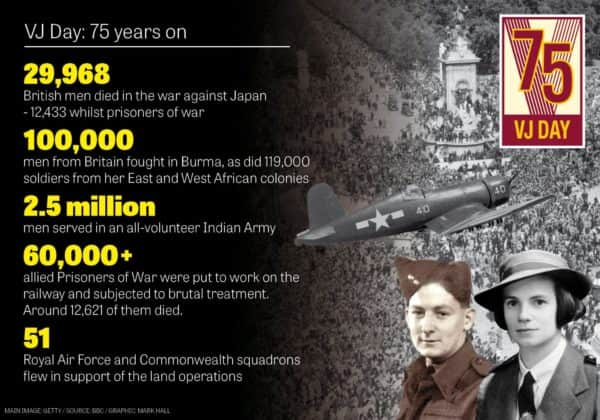VJ Day: remembering the tens of thousands who fought for peace


by George Hay, Official Historian for the Commonwealth War Graves Commission (CWGC)
On the 75th anniversary of VJ Day (August 15 2020) we will not just be remembering the end of the Second World War and the welcoming of peace.
Advertisement
Hide AdAdvertisement
Hide AdWe will be remembering tens of thousands of men and women from across the Commonwealth who spent years, often in gruelling conditions, fighting a challenging war that finally ended on August 15 1945.
While popular memory and film more often focus on the fighting in Europe, VJ Day is an important opportunity to spare a thought for those who fought on and gave their all in the pursuit of peace in the Far East, thousands of miles from home.
To this day, the CWGC’s dedicated local teams look after hundreds of cemeteries and memorials across Asia and the Pacific. Behind every name carved in stone is a story, and what follows is a small selection connected to just a few of the men and women we will remember this VJ Day, and beyond.
Lance-Corporal Ian Grant Hann, A.I.F. 2/30 Bn.
Aged 27Buried at Yokohama War Cemetery, Japan
From farming stock, Ian joined the Australian army and served in Malaya and Singapore before becoming a prisoner of war. He managed to escape his Japanese captors once with a group of Malay women who disguised him in women’s clothes. Unfortunately, he was caught and selected for work on the Burma-Thai rail project. He was later transported to Japan to work in the coal mines, but succumbed to Beriberi and malnutrition on 18 February 1945.
Warrant Officer Class II (B.S.M.) Walter Mayo, 7 Coast Regt. Royal Artillery
Aged 33Buried in Chungkai War Cemetery, Thailand
Advertisement
Hide AdAdvertisement
Hide AdWalter was a pre-war regular soldier from London. He married his wife Iris in October 1941, just before the outbreak of war with Japan. The couple said goodbye for the last time on 30 January 1942, when Iris was evacuated from Singapore. Walter was taken prisoner when Singapore fell and died of starvation in September 1943 while working on the Thai-Burma Railway. After his death Iris received a letter which simply read, “I am fit and well. Love and best wishes to all.”


Captain Mateen Ansari GC, 7th Rajput Regiment
Aged 27Buried in Stanley Military Cemetery, Hong Kong
Captain Ansari was taken prisoner during the Battle of Hong Kong in 1941. From Hyderabad, his Japanese captors pressured and tortured Mateen in a bid to turn him and his fellow Indian prisoners against the British. Despite months of mistreatment he remained loyal and even helped prisoners to escape. He was executed on October 29, 1943, and posthumously awarded the George Cross.
Sister Elaine Balfour-Ogilvy, Australian Army Nursing Service
Aged 30Remembered on the Singapore Memorial
An Australian nurse, Elaine served in Malaya and Singapore, escaping the advancing Japanese Army in 1942 aboard a steamship. Laden with injured soldiers, nurses and civilians their ship sunk off the coast of Bangka Island. Despite desperately trying to save the wounded and seek safety on the beaches, Elaine was one of scores of people marched back into the sea and executed.
Naik Fazl Din VC, 10th Baluch Regiment
Aged 24Remembered on the Rangoon Memorial, Myanmar
Fazl Din was an Indian Muslim who joined the Indian Army at the beginning of the Second World War. In March 1945 he was commanding a section in the Battle of Meiktila in central Myanmar (then Burma). While clearing bunkers, Fazl was attacked by a Japanese officer wielding a sword. Despite being severely injured, he tore the weapon from the officer’s hands and turned it on him. He continued to fight and lead his men before staggering back to HQ, where he died of his wounds. He was posthumously awarded the Victoria Cross.
If you have a story you’re connected to this VJ Day please share it to our digital wall of remembrance with #ShareYourTribute or at cwgc.org/vj-day